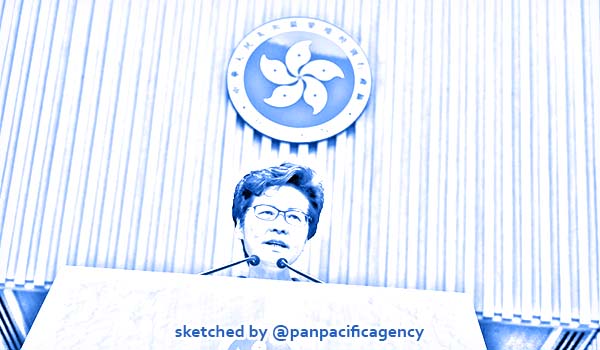‘No plans’ to bring in more laws under emergency powers: Hong Kong leader Carrie Lam

Carrie Lam says there are no current plans to bring in more legislation using emergency powers. Photo: May Tse. Sketched by the Pan Pacific Agency.
HONG KONG, Oct 8, 2019, SCMP. Hong Kong’s leader said on Tuesday she had no immediate plans to bring in more legislation by invoking emergency powers, after she imposed a mask ban on Friday that sparked further violent unrest, reported the South China Morning Post.
Chief Executive Carrie Lam Cheng Yuet-ngor also said it was too early to judge if the anti-mask law was effective in stopping protest violence, despite admitting “limitless and lawless” acts broke out over the weekend against the ban.
Speaking before meeting her advisers at the Executive Council on Tuesday morning, Lam said: “We currently have no plans to invoke the Emergency Regulations Ordinance (ERO) again to make new laws.”
Under ERO, the chief executive has tough colonial-era powers to enact new laws in an emergency or in the face of public danger, without first passing them through the Legislative Council.
Lam’s administration invoked those powers to impose a mask ban at public assemblies from after midnight on Friday in a bid to tackle protest violence, the first time the ordinance was used in more than half a century.
On Monday, executive councillor Ip Kwok-him said the administration would not rule out invoking the ordinance to impose an internet ban.
Last week, Lam made clear the government would not impose foreign exchange restrictions but refused to say if she planned to take other forms of action under the ERO, such as media censorship.
Lam also said the administration was still gauging the effectiveness of the mask ban.
“For any new … legislation, it would take time for it to be effectively implemented,” Lam said on Tuesday.
“If a piece of legislation has been enacted but the people refuse to abide by the law, then we have a problem at hand.”
Lam also said she hoped the new ban would deter protesters, especially those who were underage and thought they could break the law and get away with it by wearing masks.
She noted the latest figures show that one-tenth of those arrested on Sunday were under the age of 15.
The new anti-mask law, which critics claimed was unconstitutional, sparked several days of violence and vandalism as mobs of protesters rampaged across the city, trashing MTR stations, government property and private businesses.
Tens of thousands of Hongkongers took part in unauthorised marches, while smaller groups of radicals vandalised banks and stores with mainland China links, as well as MTR stations, as they accused the city’s rail operator of helping police’s clearance operations.
So far, at least 16 people have been charged under the mask ban, formally known as the Prohibition on Face Covering Regulation.
Those who cover their faces during protests – whether the assemblies wereauthorised or not – face a fine of up to HK$25,000 and one year in jail.
Over the weekend, Lam said protesters had caused destruction at MTR stations and certain shops, as well as attacking people who disagreed with them.
“The violence has become limitless and lawless,” Lam said.
Lam said people must not take the law into their own hands “no matter what conflict” had taken place beforehand.
In Sham Shui Po on Sunday, a taxi was rammed into black-clad protesters, injuring a woman. Angry masked groups then pulled the driver out and beat him.